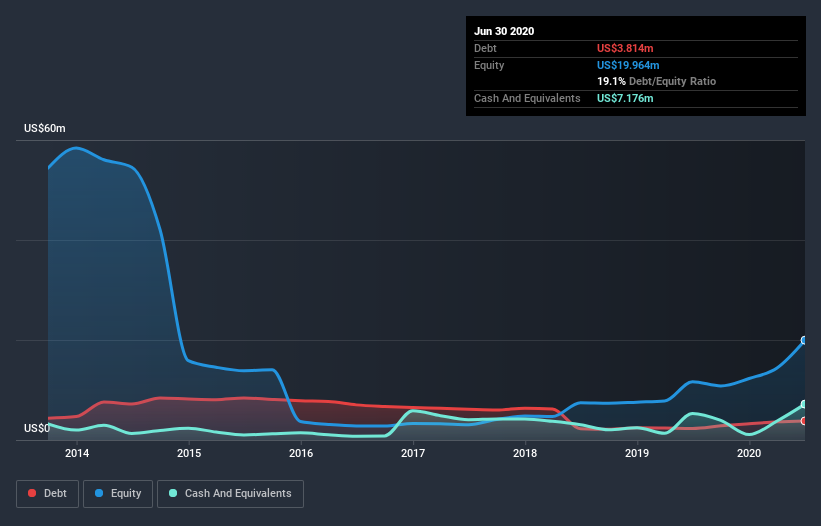Document Security Systems (NYSEMKT:DSS) Has Debt But No Earnings; Should You Worry?

Some say volatility, rather than debt, is the best way to think about risk as an investor, but Warren Buffett famously said that 'Volatility is far from synonymous with risk.' It's only natural to consider a company's balance sheet when you examine how risky it is, since debt is often involved when a business collapses. Importantly, Document Security Systems, Inc. (NYSEMKT:DSS) does carry debt. But the real question is whether this debt is making the company risky.
What Risk Does Debt Bring?
Debt and other liabilities become risky for a business when it cannot easily fulfill those obligations, either with free cash flow or by raising capital at an attractive price. Ultimately, if the company can't fulfill its legal obligations to repay debt, shareholders could walk away with nothing. However, a more common (but still painful) scenario is that it has to raise new equity capital at a low price, thus permanently diluting shareholders. Of course, the upside of debt is that it often represents cheap capital, especially when it replaces dilution in a company with the ability to reinvest at high rates of return. When we think about a company's use of debt, we first look at cash and debt together.
See our latest analysis for Document Security Systems
What Is Document Security Systems's Net Debt?
The image below, which you can click on for greater detail, shows that at June 2020 Document Security Systems had debt of US$3.81m, up from US$2.31m in one year. But on the other hand it also has US$7.18m in cash, leading to a US$3.36m net cash position.
How Healthy Is Document Security Systems's Balance Sheet?
The latest balance sheet data shows that Document Security Systems had liabilities of US$2.83m due within a year, and liabilities of US$4.62m falling due after that. On the other hand, it had cash of US$7.18m and US$2.45m worth of receivables due within a year. So it actually has US$2.17m more liquid assets than total liabilities.
This surplus suggests that Document Security Systems has a conservative balance sheet, and could probably eliminate its debt without much difficulty. Succinctly put, Document Security Systems boasts net cash, so it's fair to say it does not have a heavy debt load! There's no doubt that we learn most about debt from the balance sheet. But ultimately the future profitability of the business will decide if Document Security Systems can strengthen its balance sheet over time. So if you want to see what the professionals think, you might find this free report on analyst profit forecasts to be interesting.
Over 12 months, Document Security Systems made a loss at the EBIT level, and saw its revenue drop to US$18m, which is a fall of 5.9%. That's not what we would hope to see.
So How Risky Is Document Security Systems?
We have no doubt that loss making companies are, in general, riskier than profitable ones. And we do note that Document Security Systems had an earnings before interest and tax (EBIT) loss, over the last year. Indeed, in that time it burnt through US$5.8m of cash and made a loss of US$2.8m. Given it only has net cash of US$3.36m, the company may need to raise more capital if it doesn't reach break-even soon. Overall, its balance sheet doesn't seem overly risky, at the moment, but we're always cautious until we see the positive free cash flow. When analysing debt levels, the balance sheet is the obvious place to start. However, not all investment risk resides within the balance sheet - far from it. For example, we've discovered 5 warning signs for Document Security Systems (2 are a bit unpleasant!) that you should be aware of before investing here.
Of course, if you're the type of investor who prefers buying stocks without the burden of debt, then don't hesitate to discover our exclusive list of net cash growth stocks, today.
This article by Simply Wall St is general in nature. It does not constitute a recommendation to buy or sell any stock, and does not take account of your objectives, or your financial situation. We aim to bring you long-term focused analysis driven by fundamental data. Note that our analysis may not factor in the latest price-sensitive company announcements or qualitative material. Simply Wall St has no position in any stocks mentioned.
Have feedback on this article? Concerned about the content? Get in touch with us directly. Alternatively, email editorial-team@simplywallst.com.

 Yahoo News
Yahoo News 

